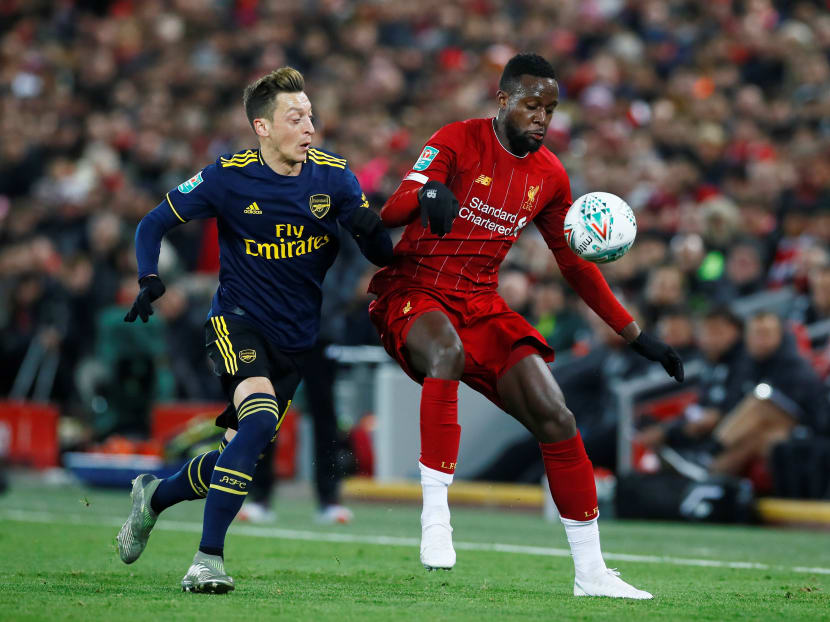Success, family or jersey: Survey finds the reasons football fans support their teams
SINGAPORE — With the English Premier League scheduled to resume on June 17, a study has found that about half of all Singaporean football fans are still supporting the team that were successful during their childhood.

Arsenal's Mesut Ozil (left) in action with Liverpool's Divock Origi in a Carabao Cup fourth-round match at Anfield, Liverpool on Oct 30, 2019.
SINGAPORE — With the English Premier League scheduled to resume on June 17, a study has found that about half of all Singaporean football fans are still supporting the team that were successful during their childhood.
One in three said that they support a team because they liked their jersey, or kit.
The survey also found that family members play an influential role in shaping a football fan’s loyalty to a particular club, with three in 10 adopting the club that their family members, particularly fathers, supported.
And a vast majority of football fans said that they would try to persuade their children to support the same team.
The findings were released on Wednesday (June 10) by travel company Expedia, which also commissioned the survey.
It was conducted by market research firm OnePoll in February, polling about 1,000 Singapore football fans aged 18 and above.
The findings resonated with football fans who spoke to TODAY, but some offered different reasons for pledging allegiance to their clubs.
Law student Sia Bao Huei, 24, said that he was in Primary 4 and Arsenal football club were on the decline when he started rooting for them.
His loyalty was renewed when Arsenal won the FA Cup in 2014, although they finished fourth in the league that year.
“Looking at the tenacity of the club, the way the team fought back in those crucial moments, sealed my love for the club,” he said.
Mr Wan Junyan, 44, the chief executive officer of the Singapore Mediation Centre, said that it was “logical” for individuals to continue supporting a club that had done well previously.
“I was a casual fan, just following football a bit. Liverpool were a very strong team then so I just watched them a bit more. I think it was their crushing 9-0 league victory (against Crystal Palace) in 1989 that really cemented my support,” he said.
Mr Isaac Tan, a 28-year-old interior designer, said that he was first exposed to football while he was in primary school by his uncle, a Liverpool supporter.
However, since he did not have cable television in his own home, Mr Tan said that he did not become a “proper” fan until his group of friends started talking about football when he was 14.
“I didn’t understand what adults meant when they asked which club I supported. Then I started reading the sports section in the newspapers,” he said. The player who turned him into a Liverpool fan was the Reds’ then-captain Steven Gerrard.
For Mr Jason Low, 26, who works as a sports marketer, he took a proper interest in football in 2018 after pursuing a degree in sports studies and marketing in university.
“Previously, I couldn’t understand the rationale of seeing 11 grown-up men chasing a ball. But due to my major in sports management, I had to study about football,” he said.
He started watching football matches because of his army friends, who were mostly Chelsea fans.
“I started to like one particular player, Eden Hazard. I love his style of playing and I slowly grew to appreciate other players and eventually the club itself,” he added.
WATCHING LIVE MATCHES
The study also found that 84 per cent of fans with children below the age of 18 would want to experience watching a live match with their children.
Mr Wan, who has been a Liverpool fan for more than three decades, has his eye on just such a goal: To catch a home game at Anfield with his two primary school-going daughters “just for the experience” if they were to visit England for a holiday.
“The (Anfield) stadium is very famous, possibly one of the most famous in the world, and the trophies are all there on display. And the stands will mostly be filled with Liverpool fans because it's a home game,” Mr Wan said.
Mr Sia said that if he were to have children, he would want to introduce the football culture to his children and make it a point to travel for matches.
“Experiencing the hype and anticipation at a live match cannot be replicated on screen.”
Recalling the first time he went to Arsenal’s Emirates Stadium, when the Gunners played Manchester City in a 2-2 draw in April 2017, Mr Sia said: “The atmosphere was great. There were people who cared for the club and shared the same joy and elation. The tension and the anticipation…”
The survey also found that 41 per cent of the respondents said that it would be “heartbreaking” if their children do not support the same team as them.
Eight in 10 with children under the age of 18 also indicated that they would try to persuade their children to support the same team.
However, Mr Wan said that he would not be affected if his daughters, aged 12, do not end up supporting Liverpool.
“You mellow with age. And you aren't so militant about what your kids do with regard to supporting football clubs, when you realise there are so many more important things you'd rather they listen to you about,” he added.
Mr Sia said that he would be okay if his future children were to support other clubs, but he would be very disappointed if they do not enjoy football at all.
“You bond with your friends and family over football. Watching football together is an awesome family activity to do. It’s quality time,” he said.









